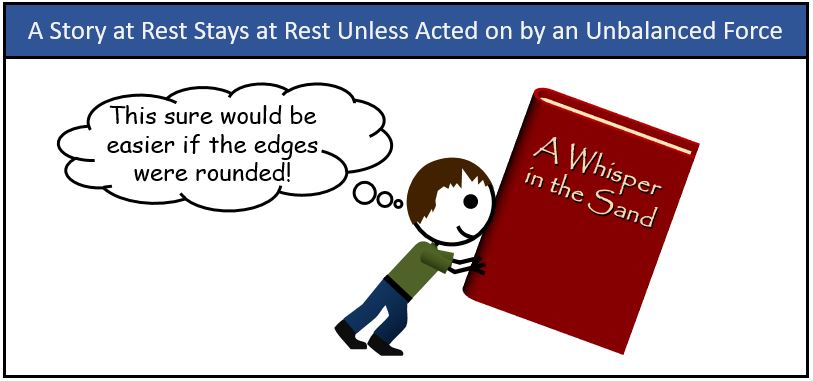Every fiction author works in a different way, even if the final output (at the broadest level) is the same… words on a page formed structurally into a story. I know some authors who struggle to get into the proper mindset for writing. Their warm-up can take hours to achieve which relegates writing to the weekend where they might knock out five or ten thousand words in a solitary sitting.
I can’t work that way. I need to be actively engaged with the story on an almost daily basis. Without that, I begin to lose touch and regaining momentum becomes positively Newtonian. Much like an object stays at rest and an object in motion stays in motion unless acted upon by an unbalanced force (such as friction), so too my writing continues to move as long as I push enough to overcome creative friction. But once it stops moving forward, it generally takes a lot more mental effort on my part to get it going again.
Thus I try to make progress in my story each evening. Usually, I have sixty to ninety minutes set aside and, if the friction is low, I can crank out a thousand words or more. Thus my efforts in aggregate approximate the same results as those who write once a week… five to ten thousand words.
In all of this I am, of course, speaking of the part-time writer, whether professional or not. For most of us, be we moderately successful or merely aspiring, that must be the truth of things because there simply isn’t enough financial gain to make it a full-time career. Honestly, I’m not sure that I would want to write full-time should that option ever come. There is something important to the structure of a ‘normal’ occupation. It provides the pauses my mind needs as I regather my thoughts for the nightly surge forward. Too long of a break and I lose focus, but too little pause and I risk writing past the reach of my inspiration.
This is because I am, fundamentally, a discovery writer. I have a basic structure and arc that keeps me focused on the ends I have in mind, but the nuances of scene and character I discover as an organic piece of the writing process. With each new session, I unearth new truths and it is important for me to allow time to process them. As I have discussed in my article on writer’s block, this sometimes means my hold on the story becomes tenuous. When that happens, I may need to pause, reset, and start again… perhaps even from the beginning. It is not always efficient (and can involve overcoming quite a bit of “friction”), but it has worked for me time and again.
The second half of writing is editing. A critical aspect of building any novel, I believe it is especially important for the discovery writer because sometimes we unearth things later in the novel that must be woven in sooner during the rewrite. Regardless of the technique, though, editing is the time to smooth and polish what was already done. It is the chance to fix all the little glitches and problems that were bypassed in the initial draft. Pausing earlier to repair every rough edge would have sapped momentum and perhaps even invoked paralysis. Thus such work is saved for the editing phase.
The two aspects, writing and editing, are very different mentally. The first is raw creativity in motion which can sometimes be indulgent in the exploration of new ideas. It involves bursts of energy and doldrums of stagnation (aka writer’s block). Editing still has creativity, but it is far more controlled. It is also far more stable. Indeed with editing, I far more successful at sustaining a daily word count goal (typically around 1,600 words a session unless I’m wrestling with a particularly rough section).
To demonstrate how different the two are, I wrote “Tears from Iron” and the forthcoming “A Whisper in the Sand” back to back. When I was done with both, I then revised them back to back. At the conclusion of this process when I began to focus on the third novel in the series, it felt like I had to discover the writing process all over again. Fortunately, much like riding a bicycle, it came back fairly quickly.
I want to conclude here with a return to the beginning. I used the phrase ‘ritual’ as the title for this piece because I believe that is what it is. Whatever mechanism an author uses as their writing process, it is important that it be sustained. By sticking to that established ritual, character and story come to life, books are completed.
